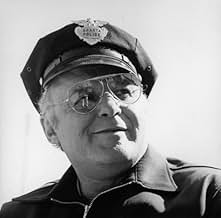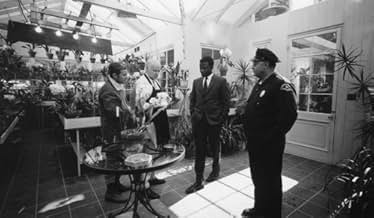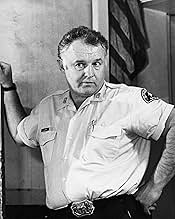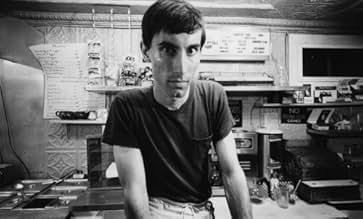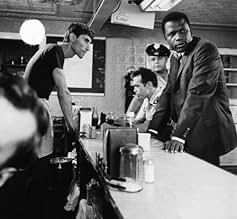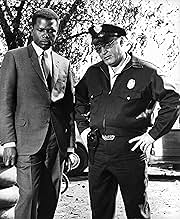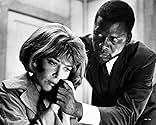Ein afroamerikanischer Polizeibeamter wird gebeten, einen Mord in einer rassistisch feindlichen südlichen Stadt zu untersuchen.Ein afroamerikanischer Polizeibeamter wird gebeten, einen Mord in einer rassistisch feindlichen südlichen Stadt zu untersuchen.Ein afroamerikanischer Polizeibeamter wird gebeten, einen Mord in einer rassistisch feindlichen südlichen Stadt zu untersuchen.
- Regie
- Drehbuch
- Hauptbesetzung
- 5 Oscars gewonnen
- 23 Gewinne & 16 Nominierungen insgesamt
William Watson
- McNeil
- (as William C. Watson)
Empfohlene Bewertungen
Whether he likes it or not, Sidney Poitier will always be remembered first and foremost as the first black actor to continuously star alongside and above his white counterparts. Just look at the opening credits to "In the Heat of the Night" and you will see that not only does he get an above the title starring credit with method maniac Rod Steiger, but his name also appears first. Something that could have easily been switched around and overlooked considering the importance of each character. But for this socially aware thriller born of the turbulent sixties, it had to be, most definitely, a conscious choice.
For Poitier, this film, along with "Guess Who's Coming To Dinner?", marks the last of his civil rights driven roles in which his character's race is an all important plot element. From "Edge of the City" to "The Defiant Ones", Poitier excelled in bringing intelligent and commanding three dimensional characters to life. A feat he had to succeed at if his films were to gain the trust of a predominantly white audience and push for racial equality. Call him the Jackie Robinson of Hollywood.
When we first see Poitier as Virgil Tibbs, he is stepping off the train in the small Mississippi town of Sparta. Although we can only see him from the waist down, we do get a quick glimpse of his hand and from that we are aware of his race. An important fact for the audience to dwell on later when Rod Steiger as sheriff Gillespie, standing over a dead body on Main Street, and calls for his deputy to round up any strangers for questioning. From that moment on, director Norman Jewison establishes the racial tension that will only grow more and more intense as the film goes on.
Sometimes, the film is far from subtle in exploring the issue of racism. Endicott's plantation, complete with tall white pillars and a black jockey lawn ornament to guard them, is a perfect example. What starts off as a surprisingly civil conversation between Tibbs and Endicott quickly turns heated and unpredictable. From that moment on, the experience will serve to cloud Tibbs' judgment and bring his own flaws to the surface, making him almost as complex a character as Gillespie.
And it is the complexity of Gillespie that got Steiger the Best Actor Oscar over Poitier in 1968. This man has heart, but not made of gold, and his motivations are far from pure. He is simply a man who believes in doing his job, and doing it as just as possible - even if it means arresting a friend for murder. Take for an example the scene in which Tibbs is surrounded by a gang of blood thirsty locals. When Gillespie arrives to save the day, he simply gives them a warning and tells them to go home. It is only when they insult him personally that he becomes angry and takes a swing. His action is just - his motivation almost vain.
In the end, after the murder is solved and racial injustice is swept back under the rug, Tibbs and Gillespie say their farewells and continue on with their very different lives. Each one better off for knowing the other.
Rating [on a 5 star system] : 5 stars
For Poitier, this film, along with "Guess Who's Coming To Dinner?", marks the last of his civil rights driven roles in which his character's race is an all important plot element. From "Edge of the City" to "The Defiant Ones", Poitier excelled in bringing intelligent and commanding three dimensional characters to life. A feat he had to succeed at if his films were to gain the trust of a predominantly white audience and push for racial equality. Call him the Jackie Robinson of Hollywood.
When we first see Poitier as Virgil Tibbs, he is stepping off the train in the small Mississippi town of Sparta. Although we can only see him from the waist down, we do get a quick glimpse of his hand and from that we are aware of his race. An important fact for the audience to dwell on later when Rod Steiger as sheriff Gillespie, standing over a dead body on Main Street, and calls for his deputy to round up any strangers for questioning. From that moment on, director Norman Jewison establishes the racial tension that will only grow more and more intense as the film goes on.
Sometimes, the film is far from subtle in exploring the issue of racism. Endicott's plantation, complete with tall white pillars and a black jockey lawn ornament to guard them, is a perfect example. What starts off as a surprisingly civil conversation between Tibbs and Endicott quickly turns heated and unpredictable. From that moment on, the experience will serve to cloud Tibbs' judgment and bring his own flaws to the surface, making him almost as complex a character as Gillespie.
And it is the complexity of Gillespie that got Steiger the Best Actor Oscar over Poitier in 1968. This man has heart, but not made of gold, and his motivations are far from pure. He is simply a man who believes in doing his job, and doing it as just as possible - even if it means arresting a friend for murder. Take for an example the scene in which Tibbs is surrounded by a gang of blood thirsty locals. When Gillespie arrives to save the day, he simply gives them a warning and tells them to go home. It is only when they insult him personally that he becomes angry and takes a swing. His action is just - his motivation almost vain.
In the end, after the murder is solved and racial injustice is swept back under the rug, Tibbs and Gillespie say their farewells and continue on with their very different lives. Each one better off for knowing the other.
Rating [on a 5 star system] : 5 stars
IN THE HEAT OF THE NIGHT is a well-crafted murder mystery with a twist. Sidney Poitier is a big city detective wrongfully arrested by a racist small police detachment after the brutal murder of the town's would-be financial savior. Once the matter is resolved and Poitier released, he finds himself aiding his former captors, including Police Chief Rod Steiger, in their quest to get to the bottom of the crime.
An Academy Award winner for Best Picture, IN THE HEAT OF THE NIGHT works on so many levels. It's a solid, unpredictable whodunit with beautiful cinematography and crisp direction from Norman Jewison. All the actors are on top of their games, particularly Steiger, whose not-entirely-likable chief gradually looks past his prejudices to warm up to Poitier. Poitier is his usual superb self, once again maintaining his vast dignity as the target of bigotry, much like he did in THE DEFIANT ONES.
And like THE DEFIANT ONES, a key theme in IN THE HEAT OF THE NIGHT is racism. In fact the racism on display here is so fierce and perverse that it's almost hard to believe (though I'm sure it didn't stretch a thing). You can't help but feel an emotional attachment to Poitier as he's subjected to taunts, attempted attacks, and off-color remarks from those who either don't realize the power of their words or don't care. Poitier proves again why he is perhaps the finest African-American actor ever to grace the screen.
IN THE HEAT OF THE NIGHT is one of those movies that, while not perfect, is impossible to dislike. It's classic, though still relevant, entertainment.
An Academy Award winner for Best Picture, IN THE HEAT OF THE NIGHT works on so many levels. It's a solid, unpredictable whodunit with beautiful cinematography and crisp direction from Norman Jewison. All the actors are on top of their games, particularly Steiger, whose not-entirely-likable chief gradually looks past his prejudices to warm up to Poitier. Poitier is his usual superb self, once again maintaining his vast dignity as the target of bigotry, much like he did in THE DEFIANT ONES.
And like THE DEFIANT ONES, a key theme in IN THE HEAT OF THE NIGHT is racism. In fact the racism on display here is so fierce and perverse that it's almost hard to believe (though I'm sure it didn't stretch a thing). You can't help but feel an emotional attachment to Poitier as he's subjected to taunts, attempted attacks, and off-color remarks from those who either don't realize the power of their words or don't care. Poitier proves again why he is perhaps the finest African-American actor ever to grace the screen.
IN THE HEAT OF THE NIGHT is one of those movies that, while not perfect, is impossible to dislike. It's classic, though still relevant, entertainment.
Whodunits are a dime a dozen in my view.What makes In the Heat of the Night so unique in the murder mystery genre is it's setting:The racially tense deep south.This is what I enjoy about the film.You have two major plot lines to keep you engrossed:The investigation into the murder itself,and the racial tensions between Sidney Poitier's Virgil Tibbs character and virtually every other character in the film.The film is loaded with great acting,particularly from Poitier,who,not surprisingly,considers this his best work and is his favorite amongst all the projects he has done.Not only is this recommended viewing,it is recommended for a spot on your home video shelf.
Outstanding performances from Poitier & Steiger in a film that's genuinely shocking once you consider the prejudice and evil it contains, even more so when you witness those same traits in society over 50 years later. Will we ever learn!
There are many bad "issues" movies out there, but this is not one of them. In a bad movie, all of the racist characters would be one dimensional and one hundred percent evil; here, Steiger is allowed to play a prejudiced man who is actually sympathetic and capable of growth (hence the Oscar). In a great twist, Virgil Tibbs himself is shown to be capable of prejudice, as he pursues Endicott without sufficient evidence. It's refreshing to see a movie that portrays the entire spectrum of racism, from the crazy extremists (and there are plenty of those on hand here) to the more subtly prejudiced.
"Mississippi Burning," a weaker effort, is not only more tediously didactic, but also less progressive; that film doesn't feature a protagonist like Virgil Tibbs, and instead focuses on the actions of two white federal agents. In this case, the old movie really is the better movie; produced at the height of the civil rights struggle, "In the Heat of the Night" feels more immediate and passionate than preachy films on the subject that were made years later, after the tension had died down.
Some reviewers complain that the mystery segments of the film are confusing, but I follow them without much trouble. Tibbs does a great Sherlock Holmes routine throughout, as he pieces together the solution based on clues that are also available to viewers. Sure, the ending is surprising, but it doesn't come entirely out of left field; I actually admire the subtle ways that clues are sewn throughout the film. If you're not used to mysteries, the barrage of red herrings and dead-end clues might surprise you, but it's pretty standard stuff for the genre.
I knew about the classic line "They call me Mr. Tibbs!" long before I actually saw this movie. I used to wonder why the line was so famous; it doesn't sound that exciting, does it? But when I finally heard Poitier say it in context, I asked my brother to pause the tape so I could cheer without missing any of the subsequent dialog. That's how excited I get during this movie. The performances are so naturalistic, and the racial conflict so vividly drawn, that I get pulled into the action completely. Though 1967 was a strong year for films, I still think that the right one got Best Picture, and not just because it was topical; "In the Heat of the Night" is a well-directed, superb character study, populated by some of the most vivid characters I've ever encountered in a movie.
"Mississippi Burning," a weaker effort, is not only more tediously didactic, but also less progressive; that film doesn't feature a protagonist like Virgil Tibbs, and instead focuses on the actions of two white federal agents. In this case, the old movie really is the better movie; produced at the height of the civil rights struggle, "In the Heat of the Night" feels more immediate and passionate than preachy films on the subject that were made years later, after the tension had died down.
Some reviewers complain that the mystery segments of the film are confusing, but I follow them without much trouble. Tibbs does a great Sherlock Holmes routine throughout, as he pieces together the solution based on clues that are also available to viewers. Sure, the ending is surprising, but it doesn't come entirely out of left field; I actually admire the subtle ways that clues are sewn throughout the film. If you're not used to mysteries, the barrage of red herrings and dead-end clues might surprise you, but it's pretty standard stuff for the genre.
I knew about the classic line "They call me Mr. Tibbs!" long before I actually saw this movie. I used to wonder why the line was so famous; it doesn't sound that exciting, does it? But when I finally heard Poitier say it in context, I asked my brother to pause the tape so I could cheer without missing any of the subsequent dialog. That's how excited I get during this movie. The performances are so naturalistic, and the racial conflict so vividly drawn, that I get pulled into the action completely. Though 1967 was a strong year for films, I still think that the right one got Best Picture, and not just because it was topical; "In the Heat of the Night" is a well-directed, superb character study, populated by some of the most vivid characters I've ever encountered in a movie.
Oscars Best Picture Winners, Ranked
Oscars Best Picture Winners, Ranked
See the complete list of Oscars Best Picture winners, ranked by IMDb ratings.
Wusstest du schon
- WissenswertesSidney Poitier insisted that the movie be filmed in the North because of an incident in which he and Harry Belafonte were almost killed by Ku Klux Klansmen during a visit to Mississippi. That's why Sparta, IL, was chosen for location filming. Nevertheless, the filmmakers and actors did venture briefly into Tennessee for the outdoor scenes at the cotton plantation, because there was no similar cotton plantation in Illinois that could be used. Poitier slept with a gun under his pillow during production in Tennessee. He did receive threats from local racist thugs, so the shoot was cut short and production returned to Illinois.
- PatzerThe police chase Harvey Oberst through the yellow leaves of an autumn forest, clearly indicating that it is not the middle of summer, as claimed in the movie. This film takes place in September, as indicated by the calendar in the Sheriff's office and not summer.
- Zitate
Gillespie: Virgil? That's a funny name for a nigger boy that comes from Philadelphia. What do they call you up there?
Virgil Tibbs: They call me MISTER TIBBS!
- Crazy CreditsNo uppercase ("capital") letters are used in the opening and closing credits, including the film's title, cast and characters, crew and job titles, and company credits.
- Alternative VersionenThe VHS prints use the 1982 United Artist variant.
- VerbindungenFeatured in Film Review: Film Review (1967)
- SoundtracksIn the Heat of the Night
Music by Quincy Jones (uncredited)
Lyrics by Alan Bergman (uncredited) and Marilyn Bergman (uncredited)
Sung by Ray Charles
Top-Auswahl
Melde dich zum Bewerten an und greife auf die Watchlist für personalisierte Empfehlungen zu.
Details
- Erscheinungsdatum
- Herkunftsland
- Sprache
- Auch bekannt als
- Al calor de la noche
- Drehorte
- Sparta, Illinois, USA(Sparta, Mississippi)
- Produktionsfirma
- Weitere beteiligte Unternehmen bei IMDbPro anzeigen
Box Office
- Budget
- 2.000.000 $ (geschätzt)
- Weltweiter Bruttoertrag
- 27.669 $
- Laufzeit
- 1 Std. 50 Min.(110 min)
- Farbe
- Seitenverhältnis
- 1.85 : 1
Zu dieser Seite beitragen
Bearbeitung vorschlagen oder fehlenden Inhalt hinzufügen




